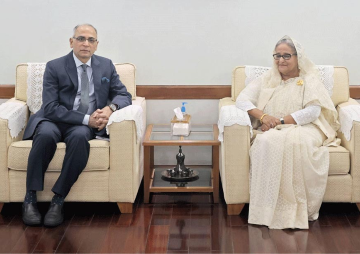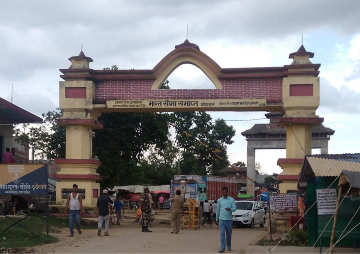One of the most enduring cliches on Jammu and Kashmir is that it is a political problem that can only be solved politically. Beside the fact that no one really defines this ‘political problem’ in clear, coherent and cogent terms to make it comprehensible, it increasingly appears that what¬ever the problem in Kashmir, politics has only exacerbated it, instead of extinguishing it.
How power corrupts
In theory, the political process in J&K is supposed to give a stake in the system to the people, address their issues and problems, usher in or at least kickstart the process of political reconciliation. The 1996 elections and the subsequent steady improvement in the ground situation seemed to validate the theory for some time. But it is to the discredit of the politicians that instead of capitalising on the improved situation, their feckless governance and their perverse politics — playing both sides of the pitch by enriching themselves by exploiting the Indian state even as they pandered to and flirted with separatists and terrorists — actually allowed things to slide back.
The experience of the last two decades suggests that the political process isn’t quite the magic bullet it is made out to be. The problem isn’t so much with the political process per se, as it is with the sort of politics being pursued. The heroic assumption that politicians will be able to manage the contradictions has been belied by their perversity, which has only deepened the cleavages and made the contradictions more stark.
Although campaigning for parliamentary elections has seen a revival of political activity in Kashmir, the election rhetoric has created a sense of foreboding about the direction in which politics will take the state. More than anything else, the election rhetoric around the two contentious constitutional articles — 370 and — is feeding the xenophobia in the Valley and creating a sort of polarisation which will be difficult to manage in the future.
While the Bharatiya Janata Party (BJP) has declared its intentions to abrogate Article 370 and annulling Article 35A, the Kashmir-centric parties have gone ballistic over any tinkering with these two provisions, even going to the extent of threatening the continuation of J&K as part of the Union of India. This sort of positioning serves the political interests of both sides. The BJP gains in Jammu as well as rest of India where its supporters will double down in their support for BJP as a reaction to the bordering-on-secession rhetoric of the Kashmiri parties. For their part, the Kashmiri parties are burnishing their Kashmiri credentials through then- blood curling warnings against any alteration in the special status given to the state.
Valley of discontent
The irony is that all sides know that there is very little, if any, chance of any constitutional change in the status of J&K. On Article 35A — which was inserted in the Constitution through the backdoor by a Presidential order, and as such is constitutionally untenable — annulling it is easier said than done. Even if the Supreme Court was to strike it down, chances are that the political repercussions will force politicians to find some way to retain the provisions of this article in one form or another.
As far as Article 370 is concerned, its been on BJPs agenda forever and yet not a small finger has been moved to abrogate it. This is not so much because the BJP doesn’t want to do it but more because the BJP cannot do it. For one, the party is unlikely to have the numbers in parliament to scrap Art.370. But even if it did have the numbers, it would still require the J&K State Assembly to ratify it, which isn’t going to happen because there is no way the necessary numbers can be garnered in the state. Plus there is the legal point of whether or not the state legislature can double up as a constituent assembly which has to approve abrogation of Art.370. Merely the question of the status of the legislative assembly could languish in the courts for years, even decades - quite like the Ram Temple case.
Articles of hope
Even as political parties make the electorate chase the proverbial taillights of the truck on Articles 370 and 35A, they have succeeded in vitiating the political debate and environment in a way which doesn’t bode well for the future either within the state or between the state and Centre. Beyond the political skulduggery over constitutional issues, there is the question of restoring political government in J&K. With state elections not being held alongside the parliamentary polls, the schedule will not be decided by who wins. Anon-B JP government is likely to announce polls within a few weeks, while a BJP-led government would be tempted to extend President’s Rule by a few months to seriously dent the ecosystem sustaining and supporting separatism.
The problem is that the longer the crackdown continues, the more grist to the mill of Kashmir-centric parties to agitate against against Delhi — one instance of this is Peoples Democratic Party batting for the mother organisation of separatism, Jamaat-e-Islami. On the other hand, if the momentum of the crackdown is lost, and a political government assumes office, it won’t be long before J&K quickly becomes the play¬ground for separatists and their masters across the Line of Control. Clearly, there is very little room for optimism that the situation will settle down in Kashmir anytime soon.
This commentary originally appeared in Mail Today.
The views expressed above belong to the author(s). ORF research and analyses now available on Telegram! Click here to access our curated content — blogs, longforms and interviews.




 PREV
PREV


